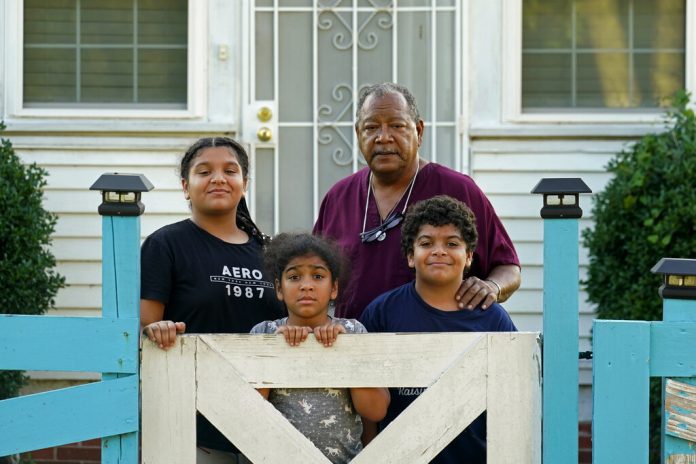
By Janet McConnaughey and Michael Phillis, Associated Press
The Environmental Protection Agency said it has evidence that Black residents in an industrial section of Louisiana face an increased risk of cancer from a nearby chemical plant and that state officials have allowed air pollution to remain high and downplayed its threat.
The agency’s 56-page letter to Louisiana officials describes early findings of racial discrimination by two Louisiana departments involving the entire corridor between New Orleans and Baton Rouge, a plant that EPA said emits large amounts of a cancer-causing chemical and a proposed plastics complex.
It said EPA has “significant evidence suggesting that the Departments’ actions or inactions” have hurt and are hurting Black residents of St. John the Baptist Parish, St. James Parish, and the 85-mile (137-kilometer) industrial corridor officially called the Mississippi River Chemical Corridor.
Robert Taylor, director of Concerned Citizens of St. John who asked the EPA to investigate the state, said his community has been failed “time and time again by every level of government.”
“This is a true and dire health emergency, and we are looking for urgent action by EPA to fix the problem in St. John where huge levels of chloroprene have just been found on top of the years of already unacceptable pollution we have been breathing,” Taylor said. “This must end.”
The letter dated Wednesday and posted on EPA’s website said it appears that for decades, the state Department of Environmental Quality has let a Denka polymer plant expose people who live nearby and children at an elementary school to enough chloroprene to increase their cancer risk.
Title VI of the Civil Rights Act of 1964 says anyone who received federal funds may not discriminate based on race or national origin. The Biden administration has stepped up its enforcement of environmental discrimination, and Title VI is part of its promise to elevate environmental justice as a goal. In September, federal officials announced the creation of the Office of Environmental Justice and External Civil Rights in the EPA.
At the request of local environmental and activist groups, the EPA opened Title VI investigations into whether Louisiana regulators have discriminated against Black residents by failing to control air pollution in the industrial section of the state that some call “cancer alley.”
EPA said the state needs to consider the cumulative impact of pollution from three Denka units with overdue permit renewals and from any of Formosa’s 14 air permits for its proposed chemical facility that it keeps or reconsiders. A state judge in Baton Rouge overturned Formosa’s permits, but her ruling was stayed during an appeal, the EPA noted.
The state environmental department should set air permit limits in the entire corridor to reduce chemicals that can bring on cancer-causing mutations, EPA said. It said Louisiana’s health department should consider all ways to protect children at Fifth Ward Elementary School from chloroprene, including finding places to move them inside and out of St. John the Baptist Parish.
Jim Harris, a Denka spokesperson, rejected any suggestion the plant contributed to an increased cancer risk and said the threshold the EPA recommends for chloroprene is based on a “faulty and outdated exposure model.” The Denka facility has significantly reduced its emissions in recent years.
The investigation into the state’s practices is not over. The agency wants its initial findings to lead to an agreement with Louisiana officials to make significant changes to its air permitting program.
“EPA’s expectation is that the information contained in this Letter will help facilitate that process and result in an expeditious resolution of each of these Complaints,” the agency said in a statement.
The EPA’s letter said it has “significant concerns” that LDEQ administration of air quality permits may already be putting people near Formosa Plastics’ proposed complex at risk, “and that these risks appear to be borne disproportionately by the Black residents.”
“They see what we are going through and they see that this is environmental racism,” said Sharon Lavigne, who founded Rise St. James to fight Formosa Plastics’ $9.4 billion plans for 10 plants and four other facilities near Welcome, a mostly Black community of about 670.
Lisa Jordan, director of Tulane’s Environmental Law Clinic and an attorney on the Title VI complaint targeting Formosa, said the EPA’s letter reflects that it’s taking the complaint seriously.
The letter “was not a finding, but rather a step in the ongoing process,” the state Department of Environmental Quality said. The agency said it will keep working “to resolve any issues and is committed to being protective of human health and the environment.”
The Louisiana Department of Health did not immediately respond to an email and calls requesting comment.
Formosa’s Louisiana affiliate, FG LA LLC, “will meet all state and federal standards, which were established in order to protect the community and the environment,” said spokesperson Janile Parks. She said the company believes its permits are sound and that the state met its duty to protect the environment.
___
Michael Phillis reported from St. Louis.
___
The Associated Press receives support from the Walton Family Foundation for coverage of water and environmental policy. The AP is solely responsible for all content.



